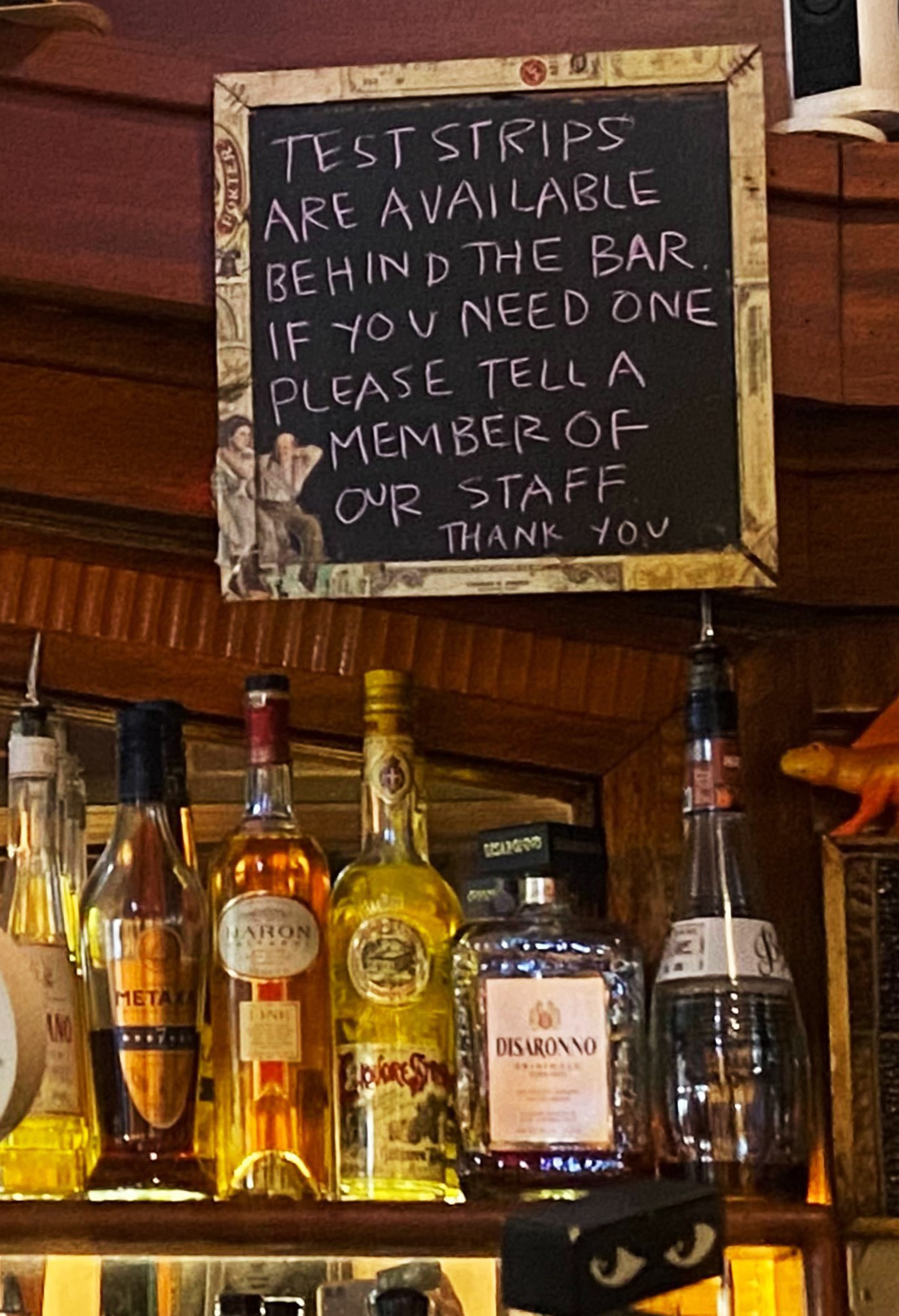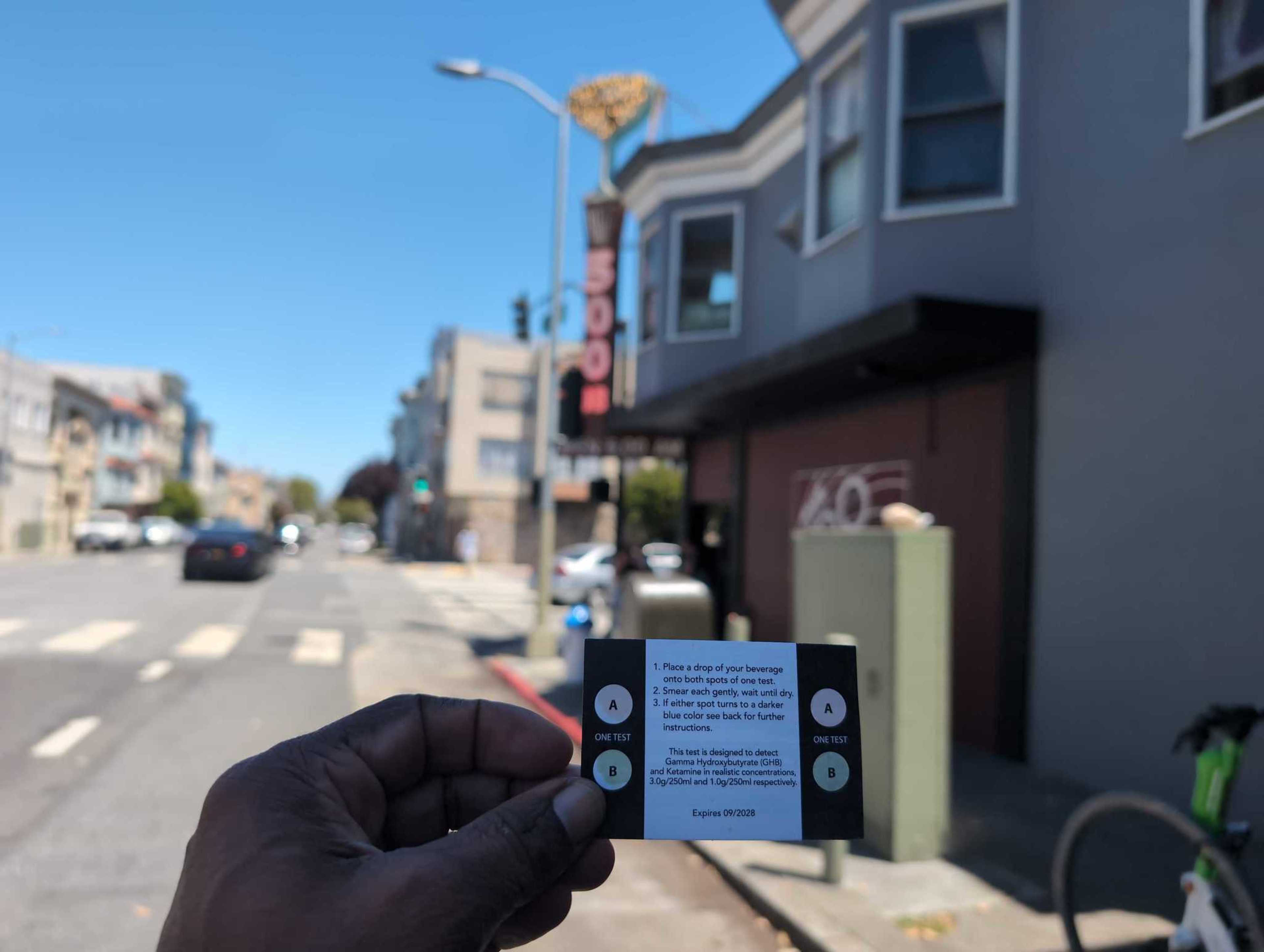As revelers bar hop over the holiday and weekend, they might notice something new at their local watering holes: signs warning them about getting “roofied” and offering test strips to check for spiked drinks.
Roughly 2,400 bars and nightclubs across California must now, by law, (opens in new tab) offer and advertise test kits for so-called date-rape drugs like ketamine and GHB to patrons. The law took effect on Monday, and it’s already a subject of controversy at several local drinking establishments.
While San Francisco bartenders who spoke with The Standard lauded the new law’s purpose—keeping patrons safe from drugs that can cause extreme drowsiness and memory impairment, leaving them vulnerable to all manner of crime—several took issue with its signage requirements and language. Others hadn’t even heard of the law.
“When I first saw the sign, I was horrified,” said Joanna Lioce, a long-time San Francisco bartender who currently works at Vesuvio Cafe in North Beach. The law lays out specific wording (opens in new tab) that businesses should use, which Lioce found frustrating. The required messaging reads, “Don’t get roofied! Drink spiking drug test kits available here.”
“I’m for anything that is going to protect someone from getting drugged at a bar, but I find the language of the signs to be very offensive,” she said. “I think it’s really triggering and really insensitive. It sounds like a ‘Got milk?’ ad and like, ‘If you get roofied, it’s your fault.’”

Some bar workers also worry the signage could freak out potential customers, implicitly signaling that that specific bar has had issues with roofies in the past.
“Of course, it’s not meant to, but if you take the sign out of context of the law, you might think that it’s already happened here,” said Drew Pedersen, a bartender at the historic Ha-Ra Club in the Tenderloin.
The bill’s author, Long Beach Assemblymember Josh Lowenthal, has described it as a necessary response to drink-spiking incidents rising to “crisis proportions (opens in new tab)” in California and beyond.
While official statistics around roofies are scarce, reports from people who suspect someone drugged them or their friends in San Francisco routinely pop up on social media sites like Reddit (opens in new tab). Last year, at least four people reported being roofied at a karaoke bar downtown.
“It’s going to make people think twice about engaging in this horrendous crime,” a Lowenthal representative said, adding that the new law also aims to raise awareness.
A representative from his team said the assembly member didn’t receive pushback on the signage or language while the law was pending last year.
‘You’re the first person to ask for one of these’
Of the 12 bars that The Standard visited on Monday and Tuesday, only six had kits and signage in place, while two bartenders were unaware of the new rules.
On Monday, inside the Mission District’s 500 Club, thirsty regulars watched the Portugal-Slovenia soccer match as they enjoyed a shady calm before a historic heat wave hit the Bay Area. Behind the bar, an amiable bartender named Cory was able to produce a test strip card when a reporter asked for one.
“You’re the first person to ask for one of these,” Cory said.

When asked how soon a sign informing patrons about the existence of test strips for use might be posted, Cory said he didn’t know yet what full compliance with the law might require.
Meanwhile, at Gold Cane Cocktail Lounge on Haight Street, a startled bartender who was asked about the new law said she hadn’t heard of it.
The bartender, who expressed worry about getting fined or in trouble, asked to take pictures of the front and back of the test-strip card a reporter had on hand.
Devin Blankenship, a spokesperson for California’s Department of Alcoholic Beverage Control, which is tasked with enforcing the rule, said there are not currently any administrative penalties for licensees who fail to comply with the law, noting that the state is focused on educating bar owners about the requirements.
“There could be future administrative penalties if a licensee were to repeatedly disregard the requirements, but we believe most, if not all, Type 48 licensees will come into compliance,” Blankenship said in an email. “ABC is committed to working with our licensees to make sure their customers are safe.”
Another quandary for bars and nightclubs is where to get the tests—which commonly come in the form of strips or straws—and how much to charge for them, if at all. The law doesn’t require them to be free but stipulates that the cost to patrons must not exceed a “reasonable amount” (opens in new tab) based on the wholesale price. Castro’s Twin Peaks Tavern charges $4 for two test cards, while Aunt Charlie’s Lounge, a gay and trans bar in the Tenderloin, (opens in new tab) charges $5 for two strips.

“If I had to give them away for free, people would want to try it just for the fun of it,” said manager Joe Mattison, adding that the bar ordered them from Amazon.
Blankenship said the department has received questions about the type of kits required and where to find them, but it isn’t recommending any providers.
“There are several wholesale sites on the internet that provide spiked drink drug testing kits at a reasonable cost,” he said.
One enterprising test company, Seattle-based Think Twice, visited hundreds of Bay Area bars in the wake of the new law to provide information about its products, president Justin Thompson said.
“Most bars didn’t even know that the law had passed and that it was being enforced,” he said.
One bar that Think Twice visited, Nite Cap in the Tenderloin, posted a sign to alert patrons of the law and noted that kits cost $2. Bartender Piper Dean said on Tuesday that she’s in favor of the legislation but that the establishment was still awaiting its order of tests to come in.
“It’s fantastic: I think it should be implemented across the entire United States, but it’s cool that California has been able to pull it off,” Dean said. “It’s for the safety of everyone.”
‘I hope people know to protect others too’
Customers were supportive of bars stocking the test strips but had reservations about the rule’s efficacy.
Nursing a highball inside Doc’s Clock on Mission Street, Tiffany Bukowski, 38, said she’s glad that bars will stock date rape drug test strips, but said it’s important that bar patrons watch out for each other since the people at risk of being roofied may already be intoxicated or may not know to be cautious when leaving a drink unattended.
“I hope people know to protect others too,” Bukowski said. “If other people see something they should step in and be proactive.”
At Lookout bar in the Castro, patron Steve Land doubted people would even use the test strips that often, fearing social conventions might make it awkward to do so in front of whoever you’re drinking with.
“How’s it going to make your date feel if you’re like, ‘Oh let me test my drink real quick’?” Land said.

Vesuvio’s Lioce said that the current lack of training around the new law means that some bar staff probably don’t know how to respond sensitively when someone asks for a test—especially if they’ve never seen the effects of roofies before.
Personally, she’s learned to look for signs of drink tampering proactively and will throw out any drinks—or people—that she suspects could be involved. She and other bartenders who spoke with The Standard say that they’ll always offer to place someone’s drink behind the bar while they go to the bathroom or put a coaster on top to protect it.
Ultimately, Lioce hopes that legislators will provide more guidance and training and revisit the language required for signs.
“It’s like they threw a really big rock into the deep end of the pool and said, ‘figure it out,’ and unfortunately, I have not been impressed by the first splashes,” she said of the current legislation. “There are some kinks with the rule—it definitely has some problems.”
